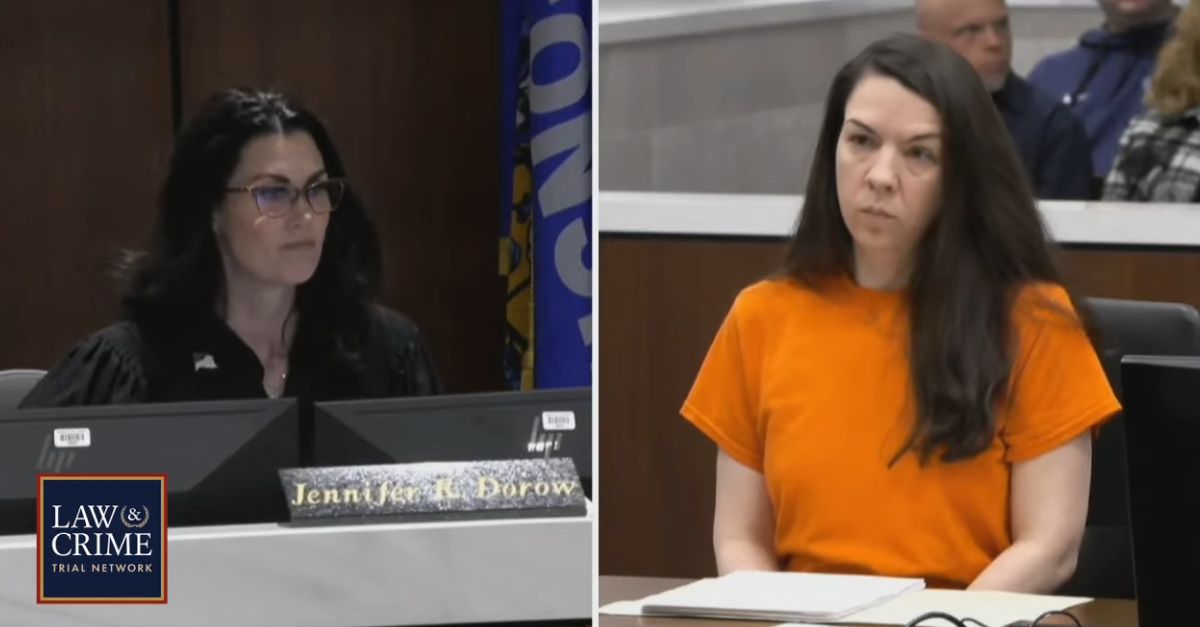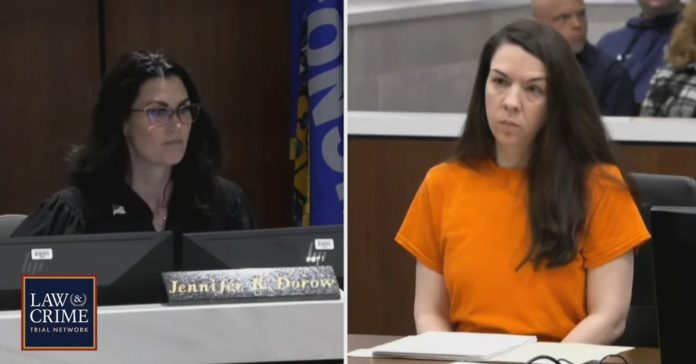Drama was all but promised as the judge overseeing the “eyedrops killer” murder case heard requests from the recently-convicted murderess’s attorneys to drop out on the eve of sentencing.
And the air was thick and brimming with drama in a Waukesha, Wisconsin, courtroom late Thursday afternoon.
Jessy Kurczewski, 39, was slated to be sentenced on Thursday for the murder of Lynn Hernan, 62, whom she killed by slowly feeding her an inordinate amount of eyedrops throughout the fall of 2018.
Now, after an alleged jailhouse plot to fraudulently cast doubt on the basic facts of the murder was detailed in a lengthy handwritten letter that purported to implicate one of her attorneys — which led to both attorneys being removed from the case — the defendant will be sentenced at an undetermined date sometime next year.
“They believe they have an actual conflict of interest, and they’ve asked to withdraw,” Judge Jennifer Dorow said after the hearing that took place in lieu of sentencing.

Left: Judge Jennifer Dorow; Right: Jessy Kurczewski. (Law&Crime Network)
The lawyers ask to leave after a letter surfaces
In recent court filings, defense attorneys Donna Kuchler and Pablo Galaviz filed motions to withdraw from the case.
Those requests were based on a scheme outlined in a 37-page letter allegedly written by Kurczewski that asks a woman to forge documents and record audio pretending to be Hernan to try and convince people the victim was severely ill and killed herself.
The lengthy cursive document attempts to implicate one of the defendant’s lawyers — though it doesn’t say which one.
“I trust you and whether you help or not this is something I need you to take to your grave,” the letter continues. “Even this envelope didn’t go out through jail mail, my attorney took it. This was one of my attorneys [sic] ideas and clearly they arent [sic] going to tell anyone.”
Those allegations were enough for both attorneys to consider their ethical obligations and, in the end, have themselves removed.
“I believe it’s an actual conflict because I’ve got the potential of being an actual witness in the matter,” Kuchler told the court on Thursday. “When there’s a possible allegation of professional misconduct — and that would certainly be misconduct if I somehow took an envelope from Ms. Kurczewski and knowingly delivered it to somebody knowing that there was a request that person commit a violation of the law, that would be illegal and professional misconduct.”
Galaviz, for his part, said he was concerned when he learned about the letter and promptly called the state bar ethics helpline. A state bar official advised him to withdraw from the case, he said.
A strange delivery and an unknown courier
The prosecutor explained that the letter was turned over to the sheriff’s office by a woman who spent time in jail with the defendant, spent at least one day in court watching the trial, and had previously contacted Kurczewski in jail via phone calls. That woman, whose name is not being released, received the letter on Nov. 25.
Curiously, however, someone physically dropped the envelope containing the letter off at the woman’s house, the prosecutor said. The state clarified the envelope was not delivered by the U.S. Postal Service. The envelope had two stamps affixed to it, but none of the markings that would have indicated it was actually sent through the mail. And, the prosecutor said, one of those stamps looked like a stamp exclusively used by the Waukesha County Jail.
“She began reading through the documents, became very concerned, was not sure what to do with them, she contacted her attorney from her previous criminal cases, who advised her to turn them into the sheriff’s department,” the prosecutor explained.
The letter was filed by the state as part of an effort to cast a negative light on the defendant’s character for purposes of sentencing.
The judge was audibly distressed about the letter and said she was inclined to simply disregard the letter for purposes of sentencing because there were simply too many questions about the whole issue.
“I don’t know how this person who turned this over, I don’t know who this is,” Dorow said. “I don’t know if law enforcement is investigating.”
The state has alleged that Kurczewski penned the letter and somehow got it out of the county jail and to her friend’s front door. Kurczewski adamantly denies the allegation. Her since-removed attorneys offered a view akin to agnosticism about the provenance.
As the hearing went on, the judge said she needed more information from the state. The state readily complied.
The prosecutor said there is an investigation into how the documents left the jail and were delivered to the recipient. There is not an investigation into the attorneys, he said. The state does not believe either attorney suggested the plot outlined in the letter, and the prosecutor characterized that allegation as a “red herring” by the defendant.
The state objected to the attorneys’ motion to withdraw.
“If this were to create a mandatory withdrawal because of conflict of interest, then why wouldn’t anybody who doesn’t like their attorney accuse them of wrongdoing?” the prosecutor asked. “It’s too simple.”
The defendant has her say
At one point, the prosecutor said the state’s position on the motion to withdraw would be different if Kurczewski was actually admitting to the plot. That would be a conflict, the state conceded.
“I don’t even know if I should consider this,” Dorow reiterated early in the hearing — at the time, unconvinced the attorneys were actually in any kind of ethical quandary. “How would there be a conflict?”
As the judge discussed her initial doubts and the ethical considerations, Kurczewski interjected: “May I speak?”
“No, not yet,” Dorow replied. “You are still represented by counsel.”
Then, Kuchler offered a piece of evidence the judge ultimately found compelling. The attorney said parts of the letter were written on the back of trial notes that were in the attorneys’ own handwriting.
“Judge, some of those notes are ours,” the attorney said. “We know our own writing.”
That argument seemed to turn the tide.
Dorow then started applying the law to the facts on the assumption that the defendant did write the letter — stressing it was just for the purpose of deciding the withdrawal motion. The judge directly addressed the defendant and said she didn’t necessarily think it “was true” but that she had to base the motion on “some facts.”
Kurczewski then loudly sighed with disagreement and spoke up again anyway as the judge raised her palm and said: “Hold on.”
“I haven’t had representation in the last week, though, and I need to be able to—” the defendant said as the judge cut her off.
“Now’s not the time,” Dorow said. “You will be given an opportunity, but I need to have facts.”
Later, Kurczewski spoke at length when asked by the judge if she still wanted either Kuchler or Galviz to represent her.
“I do not because up until yesterday, neither one has done anything for me now because they have halted all proceedings,” she said. “So, at this point, as much as I wanted to get out of Waukesha County and proceed forward and go through appeals, I don’t [want the attorneys’ representation] because nothing has been done for sentencing until last minute, yesterday, partial.”
The defendant said her letters of character were “in limbo,” and other work was left undone — leaving her unprepared for sentencing.
“I, frankly, blame the state for that,” Kurczewski said. “They proceeded to release this information, which should have not been done, and it has created this mess. So, why they [the state] are requesting they [the attorneys] should not withdraw on their behalf — I don’t think this is right. Everything has been done wrong.”
The defendant insisted she needed more time to assess her legal rights, all things considered, even though it meant more time in jail. She also maintained her innocence as to the authorship of the letter.
“I didn’t write it,” she said. “There’s cameras all over this jail. There’s recorded phone calls. There’s a lot of issues here.”
Kurczewski also offered the court a letter, which she said she did not send because of trust issues resulting from the disputed letter.
“I’ll accept that filing,” Dorow said.
Sentencing delayed
In the end, the judge painted a cautious picture of her decision to let the attorneys quit, saying she was not setting a precedent that allows any defendant to allege misconduct and jettison their lawyers.
The judge’s decision was based on several factors, the court noted, including the contemporaneous attorney’s notes on the underside of the letter, the jail stamp on the envelope, the lack of postage marks, the crease in the envelope that does not appear on the other documents, and the breakdown in communication between the defendant and the attorneys after the letter was filed.
“I am left with the inescapable and unenviable decision here today to make a finding that, at a minimum, there is a serious potential conflict of interest, perhaps even an actual conflict of interest,” Dorow said. “This is a relationship that cannot be mended.”
A status conference will be held on Jan. 12 to deal with the fallout from the change in counsel. If discovery is not complete by that date, at least one of the attorneys must attend the next hearing.
Have a tip we should know? [email protected]

